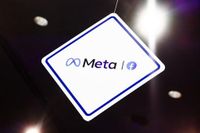Meta Platforms Inc. has emerged stronger than anticipated in the face of economic uncertainty, reporting a first-quarter revenue of $42.3 billion that surpassed Wall Street expectations. This figure, which is a 16% increase compared to the same quarter last year, beats analysts' predictions of $41.4 billion for the quarter ended March 31, 2025. The company’s performance has helped assuage investor concerns regarding the potential impact of the ongoing trade war initiated by the Trump administration.
On April 30, 2025, Meta announced that it expects its revenue for the current quarter to align with analysts' forecasts. CEO Mark Zuckerberg expressed confidence in the company’s ability to navigate through economic turbulence, stating, "Meta is well positioned to navigate economic uncertainty." This positive outlook comes as the company adjusts its strategy in response to tariff-related challenges, particularly by rethinking its suppliers and anticipating higher infrastructure costs.
In a notable shift, Meta has raised its capital expenditure forecast for 2025 to between $64 billion and $72 billion, a significant increase from the previous estimate of up to $65 billion. This boost in spending is largely aimed at enhancing its data center capabilities, which are critical for supporting the company’s ambitious artificial intelligence (AI) initiatives. Zuckerberg emphasized the importance of building a robust infrastructure to meet the opportunities ahead, saying, "The pace of progress across the industry and the opportunities ahead for us are staggering. I want to make sure that we're working aggressively and efficiently."
Despite the increased spending, Meta has lowered its total expenses forecast for the year to between $113 billion and $118 billion, down from an earlier range of $114 billion to $119 billion. This adjustment indicates a cautious approach amid rising costs associated with tariffs and the ongoing economic climate.
Meta's strong advertising performance has been a key driver behind its success, particularly as many U.S. companies tighten their marketing budgets in response to tariff-induced uncertainties. The company reported profits of $6.43 per share, exceeding estimates of $5.28 per share, which further bolstered investor confidence. Analysts project second-quarter revenue to fall between $42.5 billion and $45.5 billion, slightly above estimates of $44.01 billion.
Family daily active people (DAP)—a metric Meta uses to track unique users across its platforms—rose by 6% year-over-year to 3.43 billion. This growth underscores Meta's position as a reliable platform for advertisers, particularly during economic downturns when many companies are reconsidering their advertising expenditures. However, the company has noted a decrease in spending from some Asia-based e-commerce exporters, particularly major players like Temu and Shein, who have significantly cut their U.S. digital advertising budgets.
Meta's advertising resilience is also evident as it competes with smaller rivals. For instance, Snap Inc. recently pulled back its second-quarter forecast, citing economic uncertainty and changes in tariff policies that adversely affect its ad business. In contrast, Meta appears to be capitalizing on the situation, with analysts suggesting that if its advertising revenue remains strong, the increased capital expenditures will be easier for investors to digest.
However, Meta faces challenges beyond the economic landscape. The company is embroiled in a high-stakes trial with the U.S. Federal Trade Commission, which is seeking to unwind its acquisitions of Instagram and WhatsApp. This legal battle could significantly impact the company's future operations and market strategy.
Looking ahead, Meta's executives are optimistic about the company's trajectory. CFO Susan Li noted that the increase in capital spending is primarily directed toward enhancing data center investments to bolster AI capabilities, even as the company anticipates challenges related to tariffs affecting hardware expenses.
Despite the uncertainties, analysts like Debra Aho Williamson, founder and chief analyst at Sonata Insights, believe that Meta's proven advertising reliability positions it well to weather potential economic downturns. Williamson remarked, "If ad revenue continues to hold strong, then this increase in capital expenditures will be less of a bitter pill for investors to swallow."
As Meta continues to navigate the complexities of the current economic climate, its focus on AI and data infrastructure appears to be a strategic move aimed at sustaining growth and maintaining its competitive edge in the digital advertising space. The company’s ability to adapt to changing market conditions will be crucial as it moves forward in 2025 and beyond.




